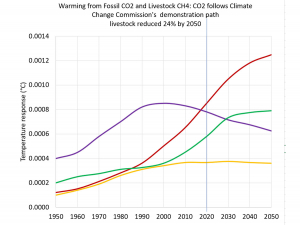DairyNZ chair wants cross-party deal
New DairyNZ chair Tracy Brown says bipartisan agreement among political parties on emissions pricing and freshwater regulations would greatly help farmers.
 Compiled from data in the PCE report: 'How much forestry would be needed to offset warming from agricultural methane'. Source: Author, based on PCE data.
Compiled from data in the PCE report: 'How much forestry would be needed to offset warming from agricultural methane'. Source: Author, based on PCE data.
OPINION: The world is choosing to eat less meat.
However, people still want to enjoy a good steak from time to time. If we decimate New Zealand agriculture, that steak will be an imported product, produced by industrial agriculture that burns fossil fuels to produce grain and soy that feeds animals instead of people.
It is expected that 1.4 billion people will be protein-deficient by 2050. New Zealand grass-fed meat can provide that steak without decreasing world food supply. Our steep hills are excellent at growing grass, but not grain or soy.
That New Zealand steak creates no additional warming, but our government is refusing to see this.
Measures of warming and emissions are not equivalent. Emissions do not describe how warm the planet gets. Warming does and it's the warming that counts.
The goal of the Paris Accord is to keep global warming under 1.5°C without threatening food production. Methane is short-lived, but CO2 warms almost forever.
New Zealand agriculture can get to zero additional warming, but can never get to zero emissions; this is a fact of ruminant digestion. Annual emission targets are untenable for agriculture. Pastoral farmers are unfairly coming under fire for receiving reasonable concessions to compensate for the short-lived nature of methane.
Warming graphs from the Parliamentary Commissioner for the Environment (PCE) reveal the cumulative nature of CO2 warming and show the inconsistency of current policy. Even with planned reductions, fossil fuels show little progress, while sheep and beef already create no additional warming.
The whole of New Zealand agriculture, including dairy, could easily reach no further warming in 2050 compared to 1990.
HWEN is targeting a 10% cut in agricultural emissions by 2030. The wider world worries about food security. In 2021, the UN called for large cuts from fossil fuel industry and five percentage points from ruminant agriculture by 2030. That's half our policy target. The HWEN plan will kill off one in five sheep farms by 2030.
I believe that the Government held a gun (the ETS) to the heads of negotiators in HWEN and the whole agreement was made under duress. Now is the time for us to reject HWEN, and make a bold gesture that will highlight the unfairness of current targets. We should aim to capture the imagination of the world and shock our government into accepting the science of zero additional warming for methane.
Doing nothing is not an option. We must not agree to a plan that will eventually force us out of food production. But equally, we must acknowledge that we do have a part to play.
This is what I propose:
We want justice; no special treatment but the same additional warming goal as the rest of the country.
We can and will get below current warming levels by 2050.
We pledge to do everything we can to help other sectors, as long as it is consistent with not reducing food production as per article 2.1(b) in the Paris Accord.
We totally reject an annual emissions metric as inappropriate for methane.
We want the ability to off-set methane with sequestration on-farm.
Sheep numbers peaked in 1978, dairy in 2017. Both sectors have turned the corner, but dairy has a way to go. Sheep and beef have already reached a zero additional warming, dairy can get there too because it is a more achievable goal.
In the light of the Government's ideologically-driven approach to climate change policy, I am calling on all farmers to instruct the partners in HWEN to insist on an additional warming target. This would be fair, enduring and consistent with the wider goals of the Paris Accord.
Dave Read farms on steep hill country west of Wairoa. He has a physics degree and has been campaigning for a warming target for agriculture since 2018.
An independent report, prepared for Alliance farmer shareholders is backing the proposed $250 million joint venture investment by Irish company Dawn Meats Group.
Whangarei field service technician, Bryce Dickson has cemented his place in John Deere’s history, becoming the first ever person to win an award for the third time at the annual Australian and New Zealand Technician of the Year Awards, announced at a gala dinner in Brisbane last night.
NZPork has appointed Auckland-based Paul Bucknell as its new chair.
The Government claims to have delivered on its election promise to protect productive farmland from emissions trading scheme (ETS) but red meat farmers aren’t happy.
Foot and Mouth Disease outbreaks could have a detrimental impact on any country's rural sector, as seen in the United Kingdom's 2000 outbreak that saw the compulsory slaughter of over six million animals.
The Ministry for the Environment is joining as a national award sponsor in the Ballance Farm Environment Awards (BFEA from next year).

OPINION: For years, the ironically named Dr Mike Joy has used his position at Victoria University to wage an activist-style…
OPINION: A mate of yours truly has had an absolute gutsful of the activist group SAFE.